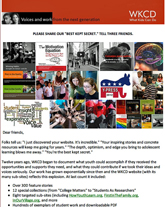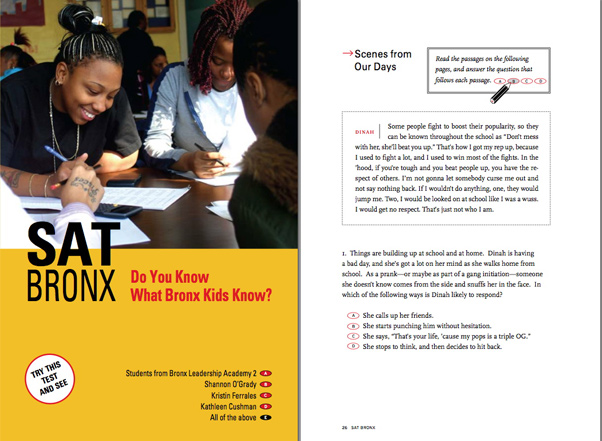SUBSCRIBE TO OUR____ NEWS BLAST
OTHER WKCD WEBSITES SPECIAL COLLECTIONS Students as Allies in School POPULAR WKCD PUBLICATIONS (PDFS] A Guide to Creating Teen- Cultural Conversations through Creative Writing Documenting Immigration Stories First Ask, Then Listen: How Your Students Can Help You Teach Them Better Making Writing Essential to Profiles of Politically Active Youth Queer Youth Advice for Educators The Schools We Need: Creating Small High Schools That Work for Us
|
Students Question High-Stakes Tests and the Common Core by WKCD| MAY 7, 2014
For more than a year, the National Center for Fair and Open Testing (better known as FairTest), a nonprofit committed to ending the misuse of standardized testing, has sent out an e-mail with a list of stories from around the country about resistance to high-stakes tests among teachers, students and parents. In a recent "blast," the editors noted: "Anyone who still believes that the resistance to testing misuse and overuse is confined to a few big cities and 'liberal' activists, should click through this week’s news clips." The growing national backlash against the Common Core State Standards and the testing programs linked to them have stirred the pot even more. On May 5, 2014, Indiana became the first state to opt out of the Common Core in a movement that is sure to spread. For years, though, students (and their teachers) have asked hard questions about high-stakes testing and standards and their impact on teaching and learning. Here we offer recent snapshots from the national news, along with excerpts from two WKCD/Next Generation Press books in which students speak up and out.
Tennessee Student Ethan Young: "We Need Change, But Not Common Core" By Anthony Cody, January 13, 2014 | blogs.edweek.org Videos of teenagers occasionally "go viral," racking up thousands of views on YouTube. But rarely do they feature discussions of education policy. This video of Ethan Young, a senior at Farragut High School, in Knox County, Tennessee, is an exception. More than two million people have watched this over the past two months, and still counting. I wrote to Ethan Young, and asked if he would . . . answer some questions. Here [are] his responses. What prompted you to take the time and engergy to speak to the Board about your education? The problems I addressed in my speech have bothered me as early as the seventh grade. In years prior, I wrote several letters to state and local legislative bodies in the hopes my concerns would be heard, but received no replies. The speech I gave was simply the first public articulation of ideas welling up over time in my mind. I felt my position as a student would present a certain "realness" that might cause the Board to be more attentive or responsive. While my estimations of the local board were erroneous, the attention I received nationally assures me my words were not arranged in vain. What has been the responsse since the video was posted? Overwhelming. Humbling. Incredible. Encouraging. I've now appeared on national news programs, radio shows, and plenty of newspapers. Each time I review an article or segment, I am heartened by the number of people a particular medium will reach. I want as many people in this discussion as possible. How have you seen high stakes testing affect your education in Tennessee? High-stakes tests complement standards-based education. As our state has implemented testable objectives in virtually every subject area, it has intentionally shifted the instructional style of teachers to one that is always measurable. In doing so, the classrooms I learned in were essentially test preparation facilities. Of course, many items on tests are crucial for students to learn and are thus being taught. Yet, this leaves much less room for a teacher to do what they do best: teach. How do you think students should be involved in the process by which decisions around standards and education are made? Student voice, like teacher voice, should be integral - not an afterthought, or even a means of validation. There is a tangible attitude in education that children are to do what the adults say, since the adults know best. They can complain and protest, but their voices should be dismissed because, well, it's petulant and uneducated. This philosophy is synonymous to a physician ignoring his patient's report of pain or symptoms because he clearly knows more about the human body. Just as a physician must, our educational legislators should know more than children about the specifics of engineering an education system. But this is no reason to dismiss student's input and ideas. How do you think we should approach education standards? Cautiously. Standards should exist to provide guidance and form to education. I imagine such standards as signs that, when followed with diligence, lead students to an ideal platform for their next ventures in life. However, these signs should not offer turn-by-turn directions, but rather general landmarks students will pass on their journey. Sometimes, the sign may offer instructions without pointing anywhere in particular, leaving direction up to the student or teacher. Flexibility is crucial. Equally important, though, is the need to articulate alongside a set of standards the reality that these guidelines detail a mere 10% of what students and teachers should enjoy in learning. Do you plan to continue to stay involved in these issues after you graduate high school? Absolutely, and I actually plan to become even more involved in these issues. I feel as a nation we were hoodwinked by Common Core and other initiatives because no one was watching. I refuse to become a non-participant. As the old adage goes, "In politics, you play or your get played." While education should not be and is not politics, politicians will never leave the institute alone. What do you think of Ethan Young's perspective? Read Anthony Cody's interview with another outspoken student at Farragutt High, Kenneth Ye.
Student Power in Providence! By Diane Ravitch, April 29, 2014 | diane ravitch's blog There are two groups that can’t be attacked by corporate reformers as greedy and self-interested: parents and students. The fake reformers automatically dismiss the voices if educators, but they can’t dismiss parents and students. No, wait, Arne Duncan ridiculed parents in New York as “white suburban moms” who were disappointed to find out their children weren’t so bright after all. But so far he hasn’t tried to dismiss the students, and no voice is more powerful than that of knowledgeable students. In Providence, Rhode Island, high school students have stood up bravely against the misuse of a standardized test as a graduation requirement. The Providence Student Union held a mayoral forum, and every candida date, from both parties, endorsed the student platform. We can all take lessons from these brilliant young people. They wrote:
A Student Says No to Standardized Testing By Taylor Lannamann, September 30, 2013 | Chronicle of Philanthropy blogs/conversations Contemporary America is constantly working toward diversity. We have become an accepting group that recognizes difference in politics, race, religion, and love. But there is one frontier that remains unexplored by the pioneers of diversity, one facet of American life that can’t seem to escape the plague of standardization: education. College seniors find themselves facing yet another standardized test, the recently created Collegiate Learning Assessment (CLA+). First, there were the tests in middle school and high school, one of the many ugly faces of No Child Left Behind. Students and teachers lost hours of class time in an attempt to receive funds. When I was a junior in high school, I took a standardized test that devoted an entire section to earthquake knowledge. I lived in New Hampshire, where the earth remains stationary and earthquake magnitudes are not part of the curriculum. I cringe to think how much money my high school lost as result of the blank pages each student handed in. Then there were the SATs, which hung over us like lead X-ray smocks, constricting safety blankets keeping us inside the small realm of accepted educational paths. Until recently, students were hard-pressed to enter decent four-year colleges without SAT scores. Although many colleges are now rendering the SAT optional, this was not the case when I applied for college. Instead of focusing on my grades or narrowing down my list of prospective colleges, I signed up for private SAT courses and learned (if you could call it that) how to write the five-paragraph essay. For many students, standardized testing ends after the SAT. Not for me. As a college senior, I find myself staring down the barrel of the GRE, asking myself: “Do I really want to do this?” I resent the GRE in all of its standardized glory. Why must I take a standardized test to study creative writing? Will memorizing the quadratic formula help me prove my ability to craft narrative? Doesn’t taking a standardized test undermine an integral component of the field, the “creative” side of writing? How often do you hear of creativity blossoming in a standardized, uniform environment? Creativity means breaking away from such monotonous practices. Fortunately, many strong M.F.A. programs in creative writing—such as those at the University of Iowa, the New School, and Hunter College—share that sentiment and do not require the GRE. I was happy to learn this, and interpreted it as a departure from archaic standardized testing. Society, at least in the arts, is finally making progress, I thought. Apparently I was wrong. Here comes the CLA+, hoping to test exiting seniors to gauge their ability to “access, structure, and use information.” On its Web site, the Council for Aid to Education states: “Over 700 institutions—both in the United States and internationally—have used the Collegiate Learning Assessment to benchmark value-added growth in student learning at their college or university compared to other institutions.” Let’s look at the word “benchmark.” Does it belong in the discourse of education? Learning and teaching is a give-and-take process, a dialogue between teacher and student. How could this possibly be measured by a standardized test? Do we, as students, want our educational experiences defined in terms of “benchmarks,” statistics, quantitative information? The Council for Aid to Education continues in its description of the CLA+’s benefits: “Graduating seniors can also use their verified scores to provide potential employers with evidence of their work-readiness skills.” What happened to communication, to intuition? If employees conducting interviews are truly unable to use basic communication skills to distinguish qualified candidates, the hiring company has a bigger problem on its hands. I am terrified that the world is becoming a place where people rely on statistics rather than genuine human connection. Imagine if kindergartens said: “You must be able to color in the lines before entering the first grade.” I would still be in kindergarten. We need to recognize the validity of educational diversity. People learn in all different ways. It is a teacher’s job to connect with students in an attempt to discover the most effective way of teaching. I know that many of our teachers and professors are doing this. Office hours, e-mails, and class discussions foster a sound education. However, that does not necessarily mean the outcome will be the same for each student. For example, when I read a book in a literature class, I am pleased to see my peers interacting with different messages. That is why I love studying literature; there are so many threads to be pulled, so many different narratives that make sense in a single work. In the same way, my college degree will mean something different than my friends’ degrees. Certain distinctive areas will have taken center stage for me while different concepts will have resonated for others. What will this look like on a standardized test? It will be inaccurate, it will be reductive, and it will be unjust. In the words of Ralph Ellison’s character Invisible Man, “Whence all this passion toward conformity anyway?—diversity is the word. Let man keep his many parts and you’ll have no tyrant states.” Just as we must recognize racial diversity, we must pay due respect to the multifarious qualities that lie on the vast educational spectrum. Say no to standardized testing.
Why I Won’t Graduate By John Wood | Hip Deep: Opinions, Essays, and Vision from American Teenagers edited by Abe Louise Young (Next Generation Press, 2006), pp. 36-38. NOTE: John Wood is a 2005 nongraduate of Federal Hocking High School, in Stewart, Ohio. “Why I Won’t Graduate” first appeared in his local newspapers in Ohio: the Athens Messenger and the Athens News. This Sunday is my high school graduation. However, despite being ranked sixth in my class, I will not be crossing the stage and my dad, our high school principal, will not be giving me a diploma. I did not drop out at the last minute and I was not expelled. I won’t be graduating because I refused to take the Ohio Proficiency Tests. I did this because I believe these high-stakes tests (which are required for graduation) are biased, irrelevant, and completely unnecessary. The bias of these tests is demonstrated by Ohio’s own statistics. They show consistently that schools with high numbers of low income and/or minority students score lower on state tests. It is argued (in defense of testing) that this is not the test’s fault, that the scores are only a reflection of the deeper social economic injustices. This is very likely true. What makes the test biased is the fact that the state does little or nothing to compensate for the differences that the students experience outside the classroom. In fact, the state only worsens the situation with its funding system. Ohio’s archaic school funding system underfunds schools in poorer areas because it is based on property taxes. The way we fund our schools has been declared unconstitutional four times, and yet the state legislature refuses to fix the problem. The irrelevance of these tests is also demonstrated by state statistics— in this case, the lack of them. In thirteen years of testing, Ohio has failed to conduct any studies linking scores on the proficiency test to college accept- ance rates, college grades, income levels, incarceration rates, dropout rates, scores on military recruiting tests, or any other similar statistic. State officials have stated that it would be too difficult or costly to keep track of their students after high school but I find this hard to believe. My high school is tracking my class for five years with help from the Coalition of Essential Schools. Certainly the state with all its bureaucrats could do the same. Both of these factors, the test’s biases and irrelevance, contribute to making it unnecessary. This system is so flawed it should not be used to determine whether or not students should graduate. More importantly, a system already exists for determining when students are ready to graduate. The ongoing assessment by teachers who spend hours with the students is more than sufficient for determining when they are ready to graduate. However this assessment is being undermined by a focus on test preparation which has eliminated many advanced courses and enrichment experiences. Additionally, since the tests do not and cannot measure things such as critical thinking, the ability to work with others, public speaking, and other characteristics of democratic citizenship, these are pushed aside while we spend more time memorizing for tests. After almost a decade and a half of testing many people cannot imagine what could be done in place of high-stakes testing, but here in southeastern Ohio alternative assessments are alive and kicking. At my school, Federal Hocking High School, every senior has to complete a senior project (I built a kayak), compile a graduation portfolio, and defend their work in front of a panel of teachers in order to graduate. These types of performance assessments are much more individualized, authentic, and are certainly difficult, something I can attest to, having completed them myself. There may be a place for standardized testing in public education, but they should not be used to determine graduation. It is because of these reasons I decided to take a stand against the Ohio Proficiency Tests even though it would cost me my graduation and diploma. But why such a drastic measure? The reason is simple—someone has to say no. Education is the key to maintaining our democracy, and I have become disgusted by the indifference displayed by lawmakers who make statements about the value of public education while continuing to fail to fairly and adequately fund it or commit to performance-based assessments. I have written a number of state senators and representatives from both parties recommending the state allow districts to set alternatives to high-stakes tests for graduation. Having done everything required for graduation but take the tests, I thought I would provide them an opportunity to rethink testing. Sadly, I have not received a response from any of them, even after personally approaching and rewriting them. What this has taught me is that one voice is not enough, and to make a difference in our democracy the people must speak with a unified voice. I encourage everyone concerned about the damage being done by high-stakes testing and inadequate funding of public education to speak out. Join me in just saying no to high-stakes testing.
TEST ALERT! BRONX, NY—In 2006 - 2007, WKCD facilitated with 14 high school students and two teachers from the Bronx, New York a yearlong conversation about the lives and learning of urban youth, both in and out of school. The students and the teachers then co-produced their own “test” based on that commentary: SAT Bronx: What We Know That You Don’t Know, by the students of Bronx Leadership Academy 2 with Kathleen Cushman, Shannon O’Grady, and Kristin Ferrales (Next Generation Press, 2008). SAT Bronx brings new perspectives to teachers and other adults about the culture of minority youth in urban schools. And students who read it realize just how much “insider knowledge” they have at their fingertips—the strengths and skills that they call on every day. Can you decode the lingo of the streets? Account for how public transit fares treat some riders better than others? Get out of a fight without making yourself a target? Stay true to your culture and your national identity? Figure out the reality behind a military recruiter’s pitch? Get yourself the education you deserve? SAT Bronx asks readers to pay close attention to the words and experiences of urban youth—then to analyze the implications of the solutions they choose. Answering its multiple-choice questions, test-takers must consider important issues of multiculturalism and equity, knowledge and skills, and the assumptions that underlie our thinking about what urban youth know and can do. Discussion questions for both youth and adults follow each section. Download a PDF version. (Order a hard copy.)
What Kids Can Do, Inc. | info@whatkidscando.org | www.whatkidscando.org
|






